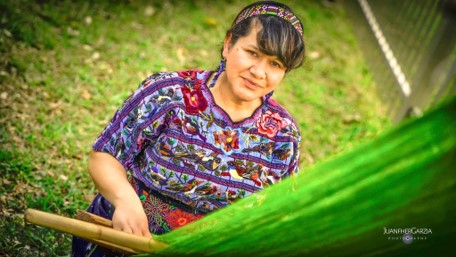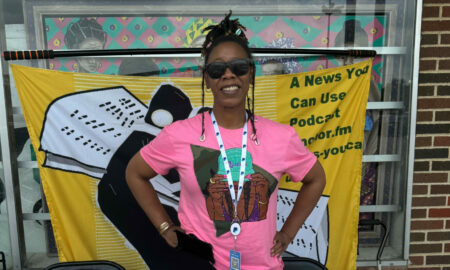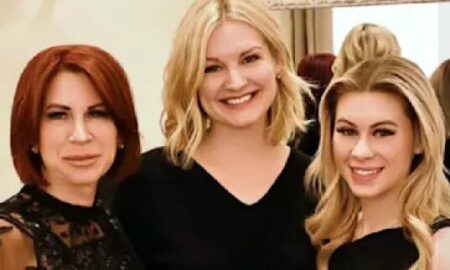

Today we’d like to introduce you to Mariola Cabria.
Mariola, please share your story with us. How did you get to where you are today?
I first opened my shop in March of 2018 but my beginnings go far beyond then. From a young age, I started weaving with a back strap hip loom to produce beautiful textiles that often times take dozens of hours. Knowing that this process was not well known in the United States, it inspired me to open up a shop where I could share my culture and the artisan talents of those in my homeland of Guatemala. Once I opened up a virtual shop via Facebook, I had foreign artisans from Mexico and Guatemala reach out to me asking about selling their beautiful crafts. Because I know how difficult the life of an artisan can be I agreed to take on the challenge of importing woven textiles, handmade leather goods, handcrafted jewelry and many other items. What started off as a small showcase of some of my work and some of my collections, became a way to give back to the humble community of artisans that are like myself.
Currently, my goal is to continue helping showcase the talent of artisans while keeping prices accessible to the Dallas community. The extreme poverty and corruption that plagues some of the neighboring towns between the Guatemala and Mexican border are part of the reason I am motivated to continue doing this work. Most of the items I sell are providing families the ability to put food on their table and send their children to school. While I am seeking to share a little piece of my culture and background with the residents of Dallas, I am even more proud to work alongside hardworking artisans and paying them a fair wage for ethical work conditions so that they can live fruitful lives.
Has it been a smooth road?
A life without challenges has very few lessons and opening Folklore & Tradition Boutique has had many lessons! When I first opened up my shop I envisioned a small shop that would showcase some of my artisan work as well as artisan items I had collected over time. However, things quickly changed and even though I felt empowered to work with other artisans, I had to figure out the legality of running a business and importing goods. My desire to impact change and create a space to share my culture has been no match for my limited English and some cultural barriers.
I am proud of what Folklore & Tradition Boutique has become and even though it has not been a smooth road, the process of learning to run a small business is very much like weaving a textile – it takes patience and creativity but the end result is beautiful!
So let’s switch gears a bit and go into the Folklore and Tradition story. Tell us more about the business.
Folklore & Tradition Boutique is dedicated to selling handmade goods from artisans in Guatemala and Mexico. We work with artisans from various regions of these countries and my goal is to work directly with artisans so that they get full and fair compensation for their handcrafted items. I don’t regatear, or bargain with artisans and I don’t like to purchase items from wholesale mercados or shops. Instead, I work with small businesses particularly family-owned businesses that sell their products as their livelihood. Most of the artisans we work with are the Tzotziles, an indigenous Maya people native to central Chiapas.
We specialize in a variety of artisan goods that are foreign made but I also continue to produce back strap woven looms, embroidered shirts as well as handmade jewelry. I am as much a part of this shop as foreign artisans and in the future I hope to start teaching back strap hip loom weaving classes to preserve this art form. What sets us apart is that we are focused on impacting change beyond the transaction of a sold good. We are actively seeking to participate with cooperativas and small businesses and practicing an ethical business model.
How do you think the industry will change over the next decade?
I expect a big increase in demand for Mayan textiles for the richness in how they are made. I also expect growth in ethical exporting of goods given that many of us know the area and are bringing attention to how much work it takes to make artisan goods. I do hope to see artisans recognized for the products they create. While many goods can be imported, it is important for us to recognize those who make these goods. I would also hope that once larger businesses start to notice how beautiful our artisan goods are, they are ethical about purchasing directly from the region where these goods are native to. This prevents appropriation of art and culture and gives credit to the hard work of artisans.
Contact Info:
- Address: Dallas Farmers Market
920 South Hardwood
Dallas, Texas 75201 - Website: https://www.etsy.com/shop/FolkloreGifts
- Email: marcabria@yahoo.com
- Instagram: @folkloreandtradition
- Facebook: https://www.facebook.com/folkloreandtradition/




 Image Credit:
Image Credit:
JuanfherGarzia Photography
Getting in touch: VoyageDallas is built on recommendations from the community; it’s how we uncover hidden gems, so if you know someone who deserves recognition please let us know here.

















